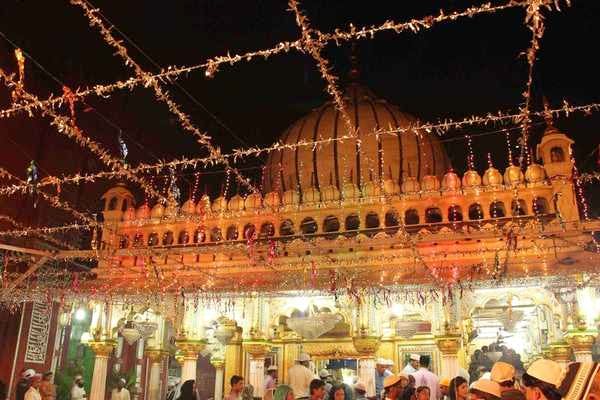There is enchantment in a yellow flame. The soft yellow of candlelight, the limpid pools cast by a tungsten lamp, the soft reddish tinge in incense sticks. Isolate yourself from the sounds about you, and the mind is set racing, more receptive, many times more alert, and curiously peaceful.
Which is among the best times to have a spiritual experience.
The Dargah of Hazrat Nizamuddin
Shortly after sunset on a smoggy Thursday, we arrived at the Dargah of Hazrat Nizamuddin Auliya, seeking ascension from our ephemeral plane to a more lasting one, a qawwali being our medium. We got what we looked for, and so much more.
Undecipherable to us were the Farsi inscriptions adorning the shrine, the screens of stone surrounding the grave of the saint, bearing some of the wise sayings that drew people to him. Inside the sanctum, a layer of rose petals many inches thick, the grave surrounded by a circumambulating line of men praying for the deceased, or seeking his intercession in the redressal of their pleas.
There was a crowd, yes. The place thrummed with its own unique noise, a hive of multiple activities. Sellers of chadars traded in the corners. Vast holders of incense sent forth thick plumes of scented smoke. Namazis were at prayer in the shrine’s mosque. Elderly men lounged about near the graves, lost in the tunnels of their memory. Blindfolded worshippers in total submission prayed at the mazaar of Amir Khusro inside the complex. In ante-rooms off the main shrine, individuals sought the help of clerics to invoke the blessings of the Almighty. Mendicants lined the corridors at the approach to the shrine.
The qawwali began at nine. The qawwals warmed up a little, the soft intonations of ‘Allah Hu’ resonating through the crowd. The tunes became more powerful as the mood was set. Seated a few feet away from the deliverers of the night’s magic, listeners swayed as the haal got into them, while the ones who knew the words sang along softly. The love for God was invoked in the terms of romance, true to the Sufi tradition. The Sufi tradition prizes its music, a direct approach to the soul, entrancing the listener, powerful words awakening a sense of devotion that our lives of today bury deep within. The qawwali has a power that rarely leaves its listeners untouched.Qawwalis are songs of devotion, their lyrics using a varied set of expressions to evoke love for Allah, the Prophet Mohammad, Hazrat Ali, or the Sufi saint at whose dargahit is performed. Qawwalis are a regular feature at Sufi shrines and have also made their way into popular culture. The amazing thing about qawwalis is that the lyrics are simple, their meaning clear, with a lot of space for the artists to improvise with their tunes.
The main vocalists and the harmonium player sit in front, with the percussionists and accompanying singers seated at the back, the hierarchy clearly visible in most performances. Once you begin to notice, it is hard to miss. The ‘green’ boys sit at the back, honing their voices as skills acquired with them will shift them forwards, one place at a time.
Above everything else, however, a place of worship is where all colours of life converge. One of them is death. The music stopped abruptly as a funeral procession marched in. The namaz-e-janaza was offered, the family of the deceased seeking the saint’s intercession for the departed soul. A few moments of solemnity, and the music began again. Life must go on for the rest of us, and not more than a few moments in the entirety of time shall be the memory of our passing.
A brilliant moon shone on the glory of the saint as the qawwals continued to sing, the listeners as entranced as the performers. We looked inwards as we were pulled momentarily out of the cycle of shifts, assignments, meetings, felt the truth of our souls drawn out before us, cleansed a little as we saw ourselves better. Not before long, though, it was time for ‘life’ again, time to get on with it and go home.
Promising to return.
Place in point
Nizamuddin Dargah
Go there for
An evening of sufi qawwalis {Thursday evenings- 4.30pm & 6.15pm}
Keep in mind
Don’t wear fancy shoes, you need to leave them outside the dargah, cameras are allowed but please don’t go crazy clicking into people’s faces- it is a place of prayer, ladies- carry a shawl or scarf to cover your head {it is considered respectful}, you don’t need to carry anything on you besides a 100 buck note if you want to present flowers at the shrine inside, put on that smile and do let us know how it went :)
*Reader Update | In winters, they have only one session of qawwali, which is at 9 pm.

